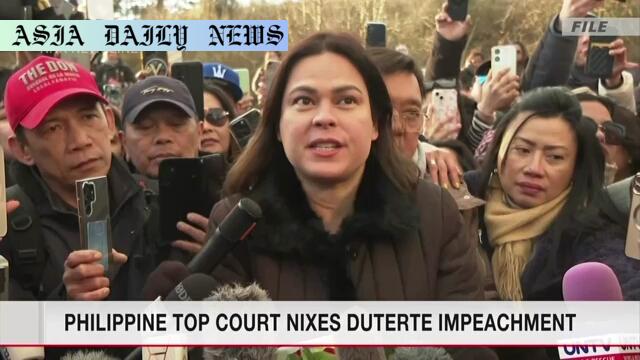Impeachment: Philippine Supreme Court strikes down articles against Vice President Sara Duterte, citing unconstitutionality.
- Philippine Supreme Court nullified impeachment articles against VP Duterte.
- The ruling deemed the allegations unconstitutional but didn’t absolve her of charges.
- The decision could enhance Duterte’s future political prospects.

Philippine Supreme Court Rules on Sara Duterte’s Impeachment
The Philippine Supreme Court delivered a unanimous ruling on Friday, declaring the impeachment articles filed against Vice President Sara Duterte unconstitutional. This landmark decision came after the House of Representatives, the lower chamber of Congress, had impeached Duterte in February. The impeachment charges stemmed from accusations that Duterte threatened to harm President Ferdinand Marcos Jr. and mismanaged public funds—allegations that Duterte has consistently denied.
While the Court’s decision stressed that the ruling was not an exoneration of Duterte from the allegations, it clearly outlined that the articles of impeachment, as filed, did not adhere to constitutional principles. This move effectively halts the impeachment proceedings, which were slated to reach the Senate impeachment court as early as next month. Legal experts hailed this decision as not merely procedural but a reaffirmation of the judiciary’s commitment to upholding constitutional safeguards.
Implications for Governance and the Rule of Law
By stepping into this politically sensitive case, the Supreme Court has underscored its role as a stabilizing force amid political discord. Duterte’s legal team welcomed the verdict, emphasizing that it upholds the rule of law and prevents potential abuses of power in the impeachment process. Observers argue that the court’s action could fortify democratic norms in the Philippines, particularly at a time when political tension and allegations of corruption could undermine public trust in government institutions.
However, critics caution against interpreting this ruling as a vindication of Duterte. Notably, the Court did not dismiss or negate the severity of the allegations altogether, suggesting that these concerns might still have merit in other legal or investigative processes. This nuanced outcome provides a balanced perspective that prioritizes due process while also emphasizing the need for accountability in public office.
Duterte’s Political Trajectory and 2028 Presidential Ambitions
The timing and nature of the Supreme Court’s ruling could have significant ripple effects on Sara Duterte’s political career. As the daughter of former President Rodrigo Duterte, she possesses considerable political capital and a loyal supporter base. Analysts suggest that this decision may bolster her popularity among her allies and position her as a viable contender for the 2028 presidential campaign. However, her detractors argue that the unresolved nature of the allegations could become a liability in the future.
Sara Duterte has repeatedly denied the accusations, portraying them as politically motivated attacks aimed at undermining her credibility and ambition. Regardless of the motivations behind the allegations, this case has brought to light the broader need for systemic reforms in addressing allegations of abuse and corruption among public officials in the Philippines. Should Duterte decide to pursue higher office in 2028, she will likely confront renewed scrutiny and public debate over these allegations, and her ability to govern effectively amid such controversy will be a key factor in shaping her political future.



Commentary
A Critical Look at the Supreme Court’s Decision
The Philippine Supreme Court’s decision to nullify the impeachment articles against Vice President Sara Duterte is undoubtedly monumental in the nation’s political landscape. It demonstrates the power of the judiciary as a counterbalance to potential overreach by legislative bodies. However, this ruling also raises critical questions about the boundaries of constitutional safeguards and whether they can sometimes shield public officials from genuine accountability.
At the heart of this issue lies a complex tension between legal technicalities and public trust. While the Court’s judgment emphasizes adherence to constitutional principles, it leaves unresolved the allegations of misconduct that triggered the impeachment process. This could erode public confidence, especially among ordinary citizens who view high-ranking officials as beholden to the law just like anyone else. The onus is now on Duterte to address these allegations transparently, either through legal recourse or public engagement, to mitigate any lingering doubts about her integrity.
Potential Impact on Governance and Political Climate
This case also underscores the fragility of the Filipino political system when it comes to holding leaders accountable. While exonerating Duterte from an unconstitutional impeachment is justified, this should not be misconstrued as a blanket absolution of wrongdoing. There exists the risk that the ruling could embolden other public officials to exploit similar technicalities to avoid scrutiny. For the judiciary to maintain its credibility, future rulings must strike a careful balance between upholding constitutional safeguards and reinforcing accountability mechanisms.
Looking ahead, Vice President Duterte’s political ambitions will undoubtedly shape how this decision is viewed in hindsight. If she uses this opportunity to champion initiatives aimed at strengthening government accountability and transparency, it could help repair some of the reputational damage caused by these allegations. Conversely, any reluctance to engage meaningfully with the criticism could tarnish her legacy and credibility, potentially undermining her aspirations for the presidency in 2028.
In the final analysis, the Supreme Court’s ruling represents both a victory for constitutional safeguards and a challenge for the Philippine political system. It offers an opportunity to strengthen governance but also serves as a reminder of the complexities of balancing legal principles with public trust. Moving forward, all stakeholders must endeavor to ensure that accountability and integrity remain at the forefront of public service in the Philippines.